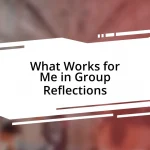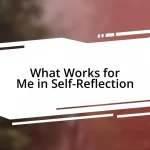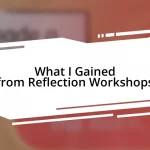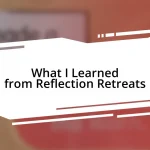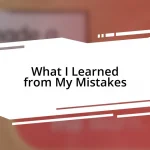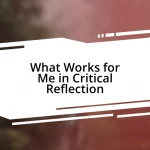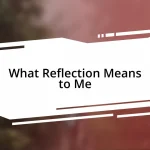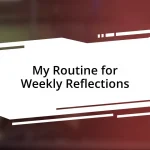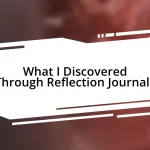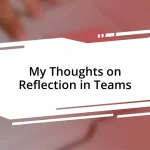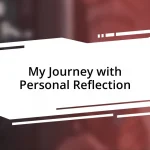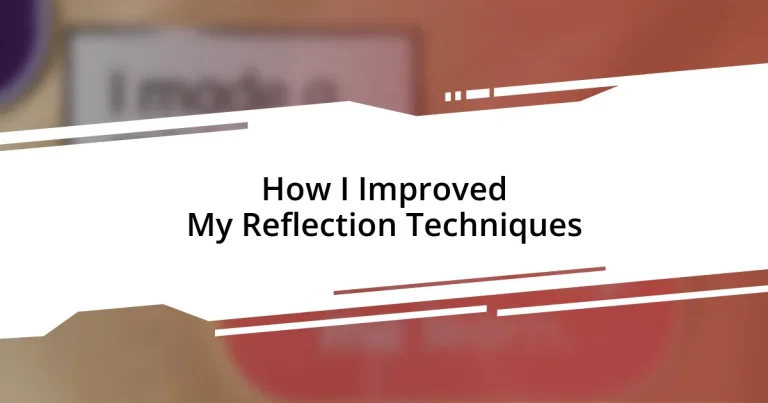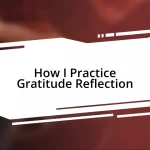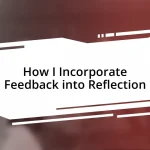Key takeaways:
- Reflection techniques, such as journaling and mindfulness, enhance self-awareness and clarify emotions.
- Identifying specific reflection needs and using structured practices like daily journaling and guided prompts can lead to meaningful insights.
- Incorporating feedback from others encourages growth and helps refine personal development strategies.
- Tracking progress over time through journaling and visual checklists highlights personal growth and the importance of self-compassion.
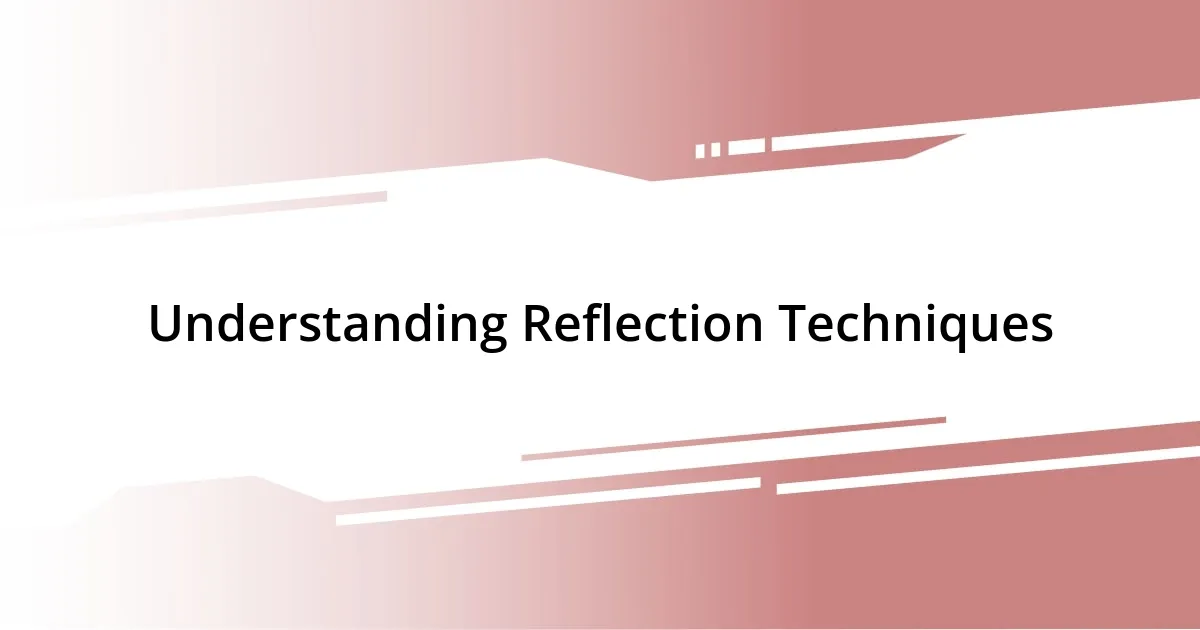
Understanding Reflection Techniques
Reflection techniques are powerful tools that allow us to dive into our thoughts and experiences. I remember the first time I tried journaling as a reflection technique; the sheer act of writing down my feelings helped me untangle the chaos in my mind. Have you ever had a moment where putting pen to paper just shifted your perspective entirely?
When I first began practicing mindfulness, I was surprised by how much clarity it brought me. By simply taking a few moments to breathe and observe my surroundings, I could tap into emotions I hadn’t acknowledged. Isn’t it fascinating how slowing down can help us see things we often overlook?
Over time, I’ve learned that different techniques resonate with different people. Some may find solace in creative outlets like painting or music, while others might prefer structured methods like guided reflections. How do you currently reflect, and what works best for you? Exploring these variations can lead to deeper self-understanding.
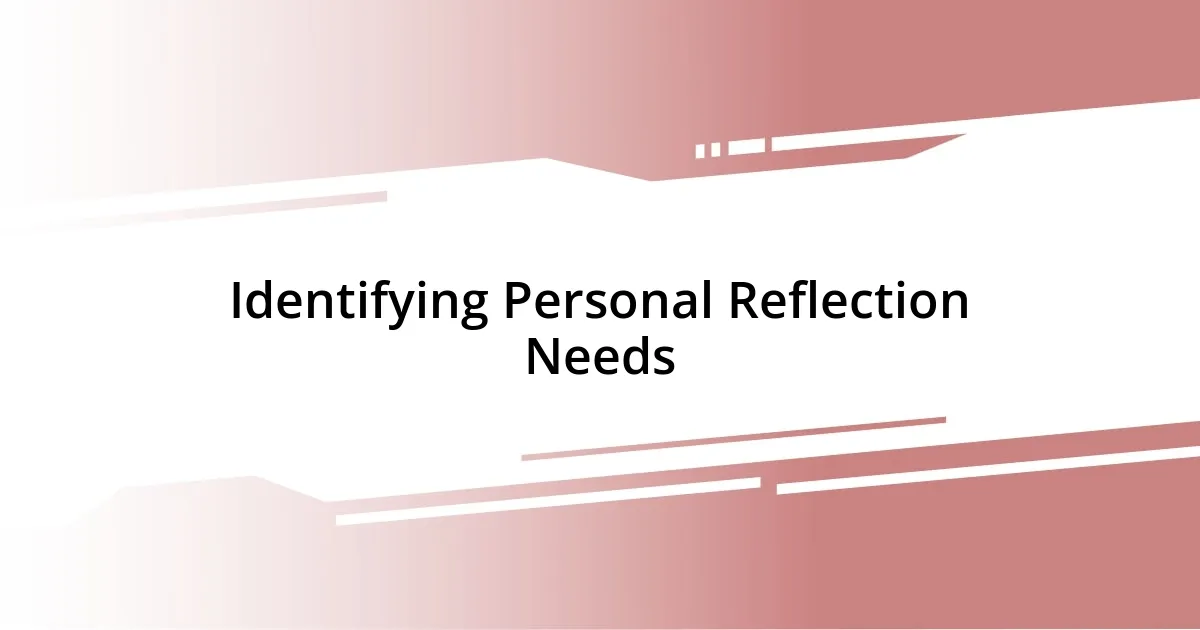
Identifying Personal Reflection Needs
Identifying what I need to reflect on has been a journey of self-discovery for me. In the beginning, I wasn’t even sure where to start. I remember feeling overwhelmed, trying to reflect on every aspect of my life at once. It wasn’t until I honed in on specific areas, like personal relationships or career goals, that I began to experience meaningful insights. Have you ever felt the weight of too many thoughts, wondering where to direct your attention?
Through trial and error, I realized that my emotional state played a significant role in what I needed to reflect upon. On days when I felt anxious, diving into my emotions helped me understand their roots. Meanwhile, after particularly stressful weeks, reflecting on my accomplishments gave me a much-needed boost. It’s like tuning into a radio station; when I focused on my feelings, I heard clearer messages from myself.
To assist in this process, I started keeping a reflection needs checklist. This tool helped me outline my priorities and stay centered on what truly mattered to me. Instead of feeling scattered, I could direct my energies into the most pressing aspects of my life. What specific themes or emotions do you think you need to explore in your reflections? Understanding this can help you craft a more effective reflection practice.
| Reflection Need | Appropriate Technique |
|---|---|
| Emotional Awareness | Mindfulness & Journaling |
| Career Goals | Structured Planning & Visualization |
| Personal Relationships | Dialogue Reflections & Active Listening |
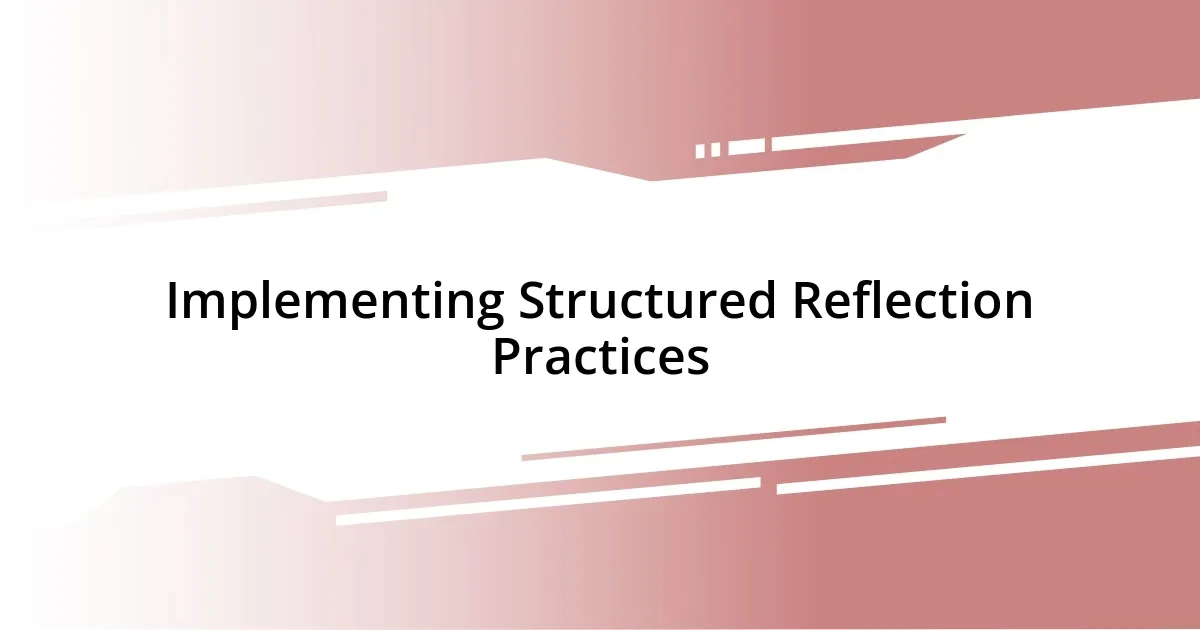
Implementing Structured Reflection Practices
Implementing structured reflection practices has been a transformative experience for me. When I first introduced a framework to my reflections, I noticed the clarity it brought. I remember a particularly hectic week where I felt overwhelmed; taking just 10 minutes each day to structure my thoughts using prompts turned my chaotic emotions into actionable insights. The process reminded me that order can arise from chaos if we take the right steps.
Here are some structured reflection practices I’ve found helpful:
- Daily Journaling: Setting aside time each evening to write down my thoughts and feelings has been a game changer.
- Guided Prompts: Using specific questions to direct my reflections helps me stay focused and uncover deeper insights. For example, asking, “What did I learn today?” can illuminate hidden lessons.
- Weekly Reviews: Taking time to evaluate the week’s highs and lows allows me to celebrate my achievements and plan for growth.
By adopting these practices, I’ve been able to transform reflective moments from mundane activities into profound opportunities for growth. Each method serves as a reminder that reflection doesn’t have to be overwhelming; it can be an organized, enlightening experience.
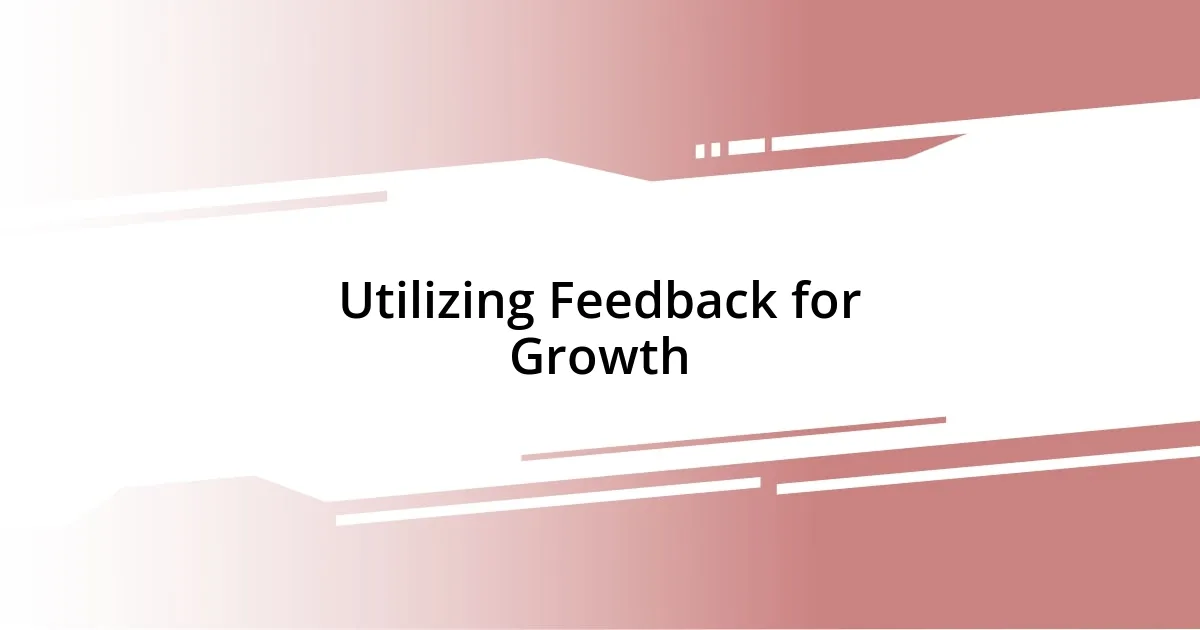
Utilizing Feedback for Growth
Utilizing feedback effectively has been crucial for my growth. I learned early on that constructive criticism isn’t something to fear; it’s an invitation to improve. I remember a time when a colleague pointed out that I tended to rush through my presentations. Instead of feeling discouraged, I took it as a chance to refine my delivery. How often do we let feedback slip through the cracks instead of embracing it?
Over time, I developed a habit of actively seeking feedback from various sources—a mentor, trusted friends, or even online communities. This diverse input has been invaluable. One memorable instance was when a mentor suggested I adjust my communication style for different audiences. Implementing that advice made a noticeable difference in my interactions. Have you ever considered how multiple perspectives could enrich your understanding of your own work?
Despite the potential discomfort, I’ve come to see feedback as a mirror reflecting my strengths and weaknesses. When I receive a critique, I take a moment to process it emotionally. In the beginning, I might feel defensive, but I remind myself of the growth that can follow. Embracing these moments has allowed me to evolve into a better version of myself, and I wonder, how has feedback shaped your journey?
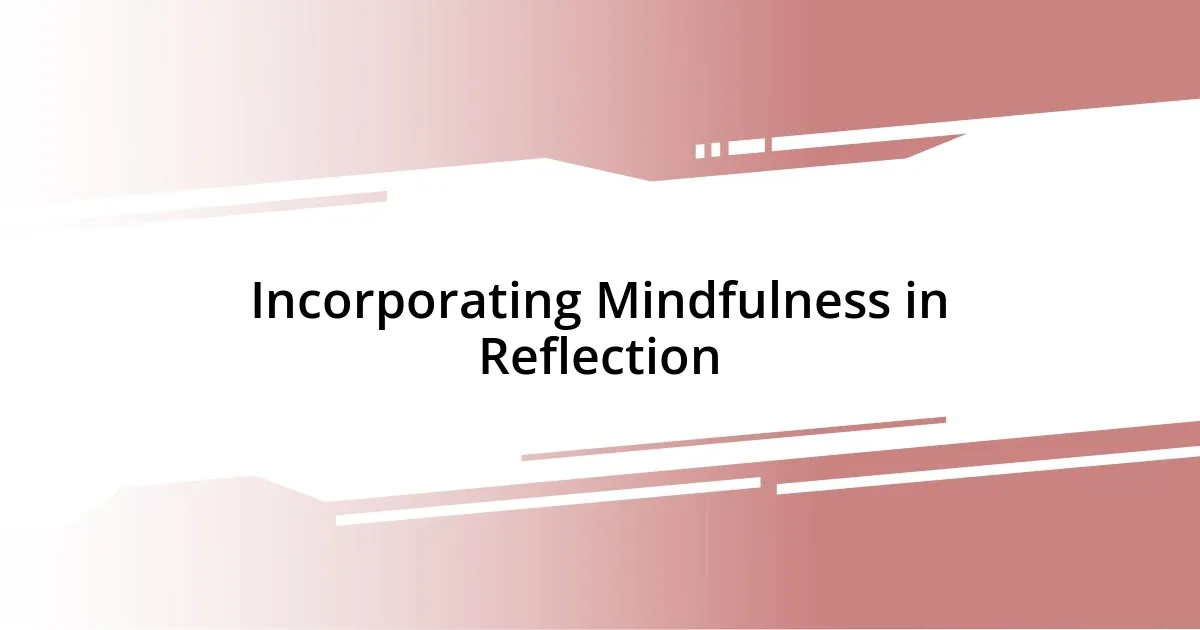
Incorporating Mindfulness in Reflection
Incorporating mindfulness into my reflection practice was a game changer. When I began to focus on the present moment during my reflections, everything shifted. I vividly remember a time when, instead of racing through my thoughts, I took a few deep breaths and centered myself. That simple act helped me engage more fully with my emotions and thoughts, allowing me to discover insights I might have overlooked in my usual hurry.
Mindfulness encourages you to observe your thoughts without judgment, which has been incredibly enlightening for me. I often ask myself, “What am I feeling right now?” This awareness allows me to navigate through my experiences rather than just glossing over them. The other day, while reflecting, I noticed a wave of anxiety wash over me. Instead of dismissing it, I paused and asked why I felt that way. This practice revealed underlying concerns I hadn’t fully acknowledged, leading to a clearer understanding of my emotional landscape.
Integrating mindfulness into reflection also deepens the connection to my experiences. I’ve started to visualize my thoughts as clouds drifting by, which helps me detach from them. It’s surprising how this simple visualization allows me to process challenging moments without becoming overwhelmed. By asking, “How does this moment serve my growth?” I find the silver linings more easily. Have you tried a mindfulness approach in your own reflection? If not, I wholeheartedly recommend it; it can open doors to understanding that you never knew existed.
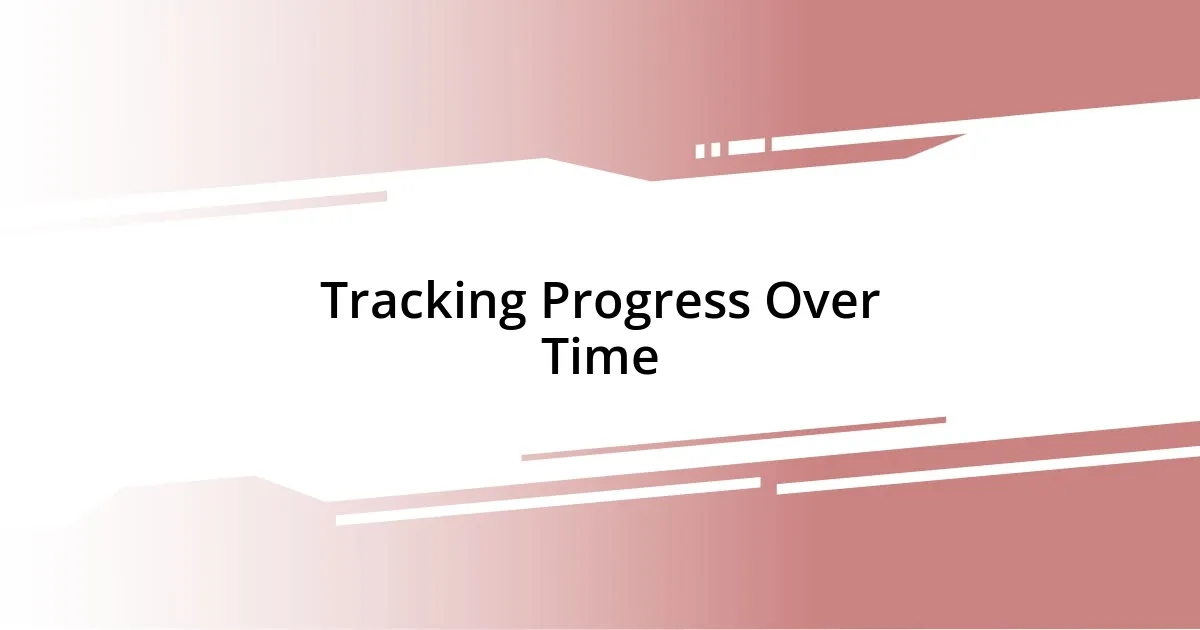
Tracking Progress Over Time
Tracking my progress over time has revealed much about my growth journey. I decided to keep a journal specifically dedicated to my reflective practices, and looking back at my entries has been eye-opening. There was a phase when I felt stagnant in my personal development, but re-reading those past reflections reminded me of the challenges I overcame. Have you ever experienced that moment when you realize just how far you’ve come?
I also created a simple visual tracker, with check-ins every month. At first, it seemed trivial, but I found joy in marking milestones, however small. For example, I noted down when I successfully implemented feedback from my mentor or made conscious efforts to practice mindfulness during my reflections. Those little checkmarks became a source of motivation. It’s fascinating how progress can often go unnoticed until we take the time to document it, isn’t it?
Over time, I started to analyze patterns in my reflections. One realization that struck me was how my emotional state influenced my ability to absorb feedback. There were weeks when I felt overwhelmed, and it showed in my progress logs—leaving me wondering why I wasn’t advancing as quickly. Reflecting on this has taught me the importance of self-compassion during my development. Have you considered how your emotions play into your journey? Understanding this connection has been a pivotal part of my growth.
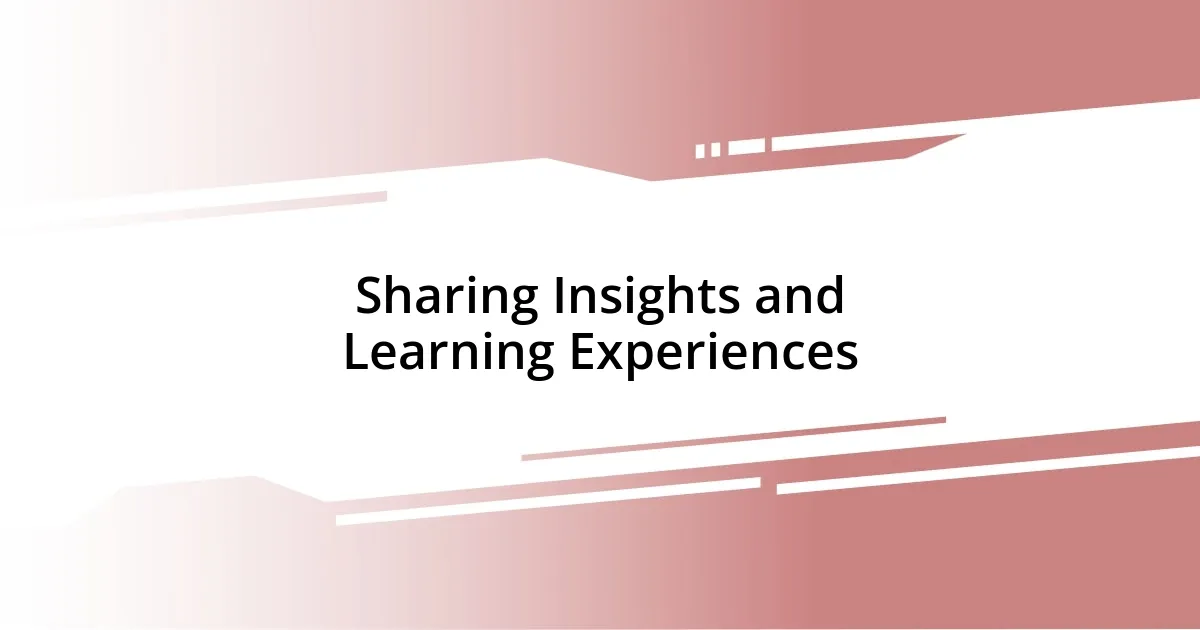
Sharing Insights and Learning Experiences
Sharing insights and learning experiences has been incredibly valuable for my reflection journey. I remember a specific moment when I shared my struggles with a friend during a casual coffee chat. As I articulated my challenges, their questions prompted me to rethink my approach entirely. Have you ever realized that sharing can often light the way for deeper understanding? In my case, this exchange unveiled new perspectives that I hadn’t considered before.
Engaging in group reflection sessions has also played a crucial role in my development. There’s something powerful about hearing others’ experiences; it can be both comforting and illuminating. Once, a colleague shared how they navigated a frustrating project, and it resonated deeply with my own recent experiences. This exchange made me think, “What can I learn from their journey?” I found myself approaching my challenges with renewed curiosity and inspiration, driven by the collective wisdom around me.
Additionally, I’ve started a practice of writing brief reflections after sharing learning experiences. I call these my “reflection recaps.” It’s fascinating to revisit these entries, as they often reveal growth I may not have noticed in the moment. One time, after discussing a particularly tough week with my family, I realized how much their support had influenced my resilience. Have you ever paused to notice how external insights shape your inner journey? Recognizing the intertwining of my experiences with those around me has enriched my understanding and made my reflections much more profound.
